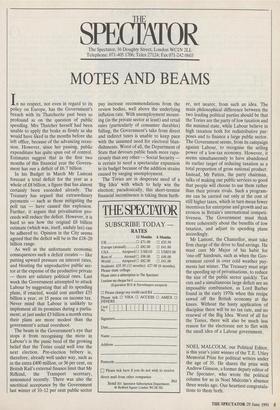SPECTATOR
The Spectator, 56 Doughty Street, London WC1N 2LL Telephone: 071-405 1706; Telex 27124; Fax 071-242 0603
MOTES AND BEAMS
In no respect, not even in regard to its policy on Europe, has the Government's breach with its Thatcherite past been so profound as on the question of public spending. Mrs Thatcher herself had been unable to apply the brake as firmly as she would have liked in the months before she left office, because of the advancing reces- sion. However, since her passing, public expenditure has quite spun out of control. Estimates suggest that in the first two months of this financial year the Govern- ment has run a deficit of £6.7 billion.
In his Budget in March Mr Lamont forecast a total deficit for the year as a whole of £8 billion, a figure that has almost certainly been exceeded already. The Treasury has argued that extraordinary payments — such as those mitigating the poll tax — have caused this explosion. Further, it argues that privatisation pro- ceeds will reduce the deficit. However, it is hard to see how the original £8 billion estimate (which was, itself, unduly lax) can be adhered to. Opinion in the City seems agreed that the deficit will be in the £18-20 billion range.
As well as the unfortunate economic consequences such a deficit creates — like putting upward pressure on interest rates, and bloating the unproductive public sec- tor at the expense of the productive private — there are salutary political ones. Last week the Government attempted to attack Labour by suggesting that all its spending plans, if enacted, would cost another £35 billion a year, or 15 pence on income tax. Never mind that Labour is unlikely to implement all its promises during a parlia- ment; at just under £3 billion a month extra their plans are more modest than the government's actual overshoot.
The beam in the Government's eye that stops it from recognising the mote in Labour's is the panic bred of the growing belief that the Tories could well lose the next election. Pre-election bribery is, therefore, already well under way, such as in the extra £400 million, or 36 per cent, on British Rail's external finance limit that Mr Rifkind, the Transport secretary, announced recently. There was also the uncritical acceptance by the Government last winter of 10-12 per cent public sector pay increase recommendations from the review bodies, well above the underlying inflation rate. With unemployment mount- ing (in the private sector at least) and retail sales (particularly of consumer durables) falling, the Government's take from direct and indirect taxes is unable to keep pace with the assumed need for electoral blan- dishments. Worst of all, the Department of State that devours public funds more rapa- ciously than any other — Social Security is certain to need a spectacular expansion in its budget because of the addition strains caused by surging unemployment.
The Tories are in desperate need of a `Big Idea' with which to help win the election; paradoxically, this short-termist financial incontinence is taking them furth- er, not nearer, from such an idea. The main philosophical difference between the two leading political parties should be that the Tories are the party of low taxation and the minimal state, while Labour believe in high taxation both for redistributive pur- poses and to finance a large public sector. The Government seems, from its campaign against Labour, to recognise the selling power of a low-tax economy. However, it seems simultaneously to have abandoned its earlier target of reducing taxation as a total proportion of gross national product. Instead, Mr Patten, the party chairman, talks of making our public services so good that people will choose to use them rather than their private rivals. Such a program- me can be carried out only at the cost of still higher taxes, which in turn mean fewer incentives for enterprise and growth and an erosion in Britain's international competi- tiveness. The Government must think more coherently about the benefits of low taxation, and adjust its spending plans accordingly.
Mr Lamont, the Chancellor, must take firm charge of the drive to find savings. He must cure Mr Major of his habit for `one-off handouts, such as when the Gov- ernment caved in over cold weather pay- ments last winter. The Treasury must urge the speeding up of privatisation, to reduce the size of the public sector quickly. Tax cuts and a simultaneous large deficit are an impossible combination, as Lord Barber found in the early 1970s when this recipe sawed off the British economy at the knees. Without the hasty application of discipline there will be no tax cuts, and no renewal of the Big Idea. Worst of all for the Tories, there will also be much less reason for the electorate not to flirt with the small idea of a Labour government.
NOEL MALCOLM, our Political Editor, is this year's joint winner of the T.E. Utley Memorial Prize for political writers under the age of 35. He shares the prize with Andrew Gimson, a former deputy editor of The Spectator, who wrote the political column for us in Noel Malcolm's absence three weeks ago. Our heartiest congratula- tions to them both.


















































 Previous page
Previous page